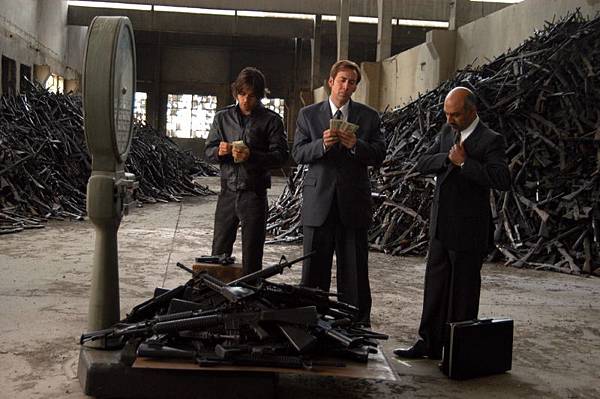First a small rant: Nicholas Cage should really get hired to act in better movies.
His remarkable talent is being wasted in other movies not worth his time.

Now into the film.
Just watched the movie, and heard all the pithy statements.
The whole tone is of Nietzschean origin, but pessimistic instead of optimistic.
Or we could say, it is pre-Nietzschean, and has taken the other route.
The most memoriable moment to most is probably this quote by Yuri, the protagonist:
"They say 'Evil prevails when good men fail to act.' What they ought to say is: 'Evil prevails.'"
And that is probably to concede completely that the will to power is all there is, is all I have, and is all I care for.
This serves as a kick in the gut for the audience, to agitate them into proving the protagonist (Antagonist?) wrong.
The film's namesake is used in the film to refer to the African President purchasing the firearms,
but the African President used it to refer in some honorary fashion, our dear arms dealer.
Even if the President is the one conventionally designated as the "warlord,"
the arms dealer himself is intimately related to war. He gets to choose who will have which weapons,
and who will fight each other, and is frustrated when people don't get to die for his profit.
This calls into question a problem in ethics:
Are you justified for achieving an innocent end when the means are evil?
Let us put it in stronger form: Can you separate the means and the end?
Yuri explains to his wife that nothing he does is illegal,
and that is a slight of hand (slight of language) to say that he is doing nothing wrong,
but his wife sidesteps the legal/illegal dichotomy (which is Yuri's own sidestepping the issue),
and confronts him directly: I don't care if it's legal! It's wrong.
Granted, Yuri could merely be making a living (by making a killing).
But all this crumbles in his answer: "It's not about the money... I'm good at it."
Of course, this could read: It's what I do to prove myself.
The protagonist did, however, redeem himself,
in putting down the business, but taking up another form of exploitation as a profession.
This could raise questions in the audience's mind: "Is every business an exploitation?"
But at least Yuri is farther removed from murder.
Then his past catches up with him and forces him back into the trade.
(I am being generous here; greed played a large factor as well.)
But this time, he is forced to confront his own evil nature by despising the evil of the African President.
He finds that, as an arms dealer, he still hates him,
but the African President himself has become seemingly more innocent than he:
The President was merely referring him to another client.
The President himself is now only indirectly related to war; in fact, more so than Yuri.
Now Yuri is forced to hate himself.
This is the true point where he finally loses all humanity.
He is evil, but "necessary evil."
Evil prevails, in the form of the United States (and other powerful countries).
The rest is just trickle down economics.
His last lines sum it up:
"You know who's going to inherit the Earth? Arms dealers.
Because everyone else is too busy killing each other.
That's the secret to survival.
Never go to war. Especially yourself."
Except that last line. That was an intentional typo.
It actually read: "Never go to war. Especially with yourself."
Translation: Be evil, and be good at it. Be evil all the way. Do not hesitate.
Of course, like the movie's ending, I could always decide whether to give you this conclusion,
or explicitly motivate you to prove me wrong.


 留言列表
留言列表

